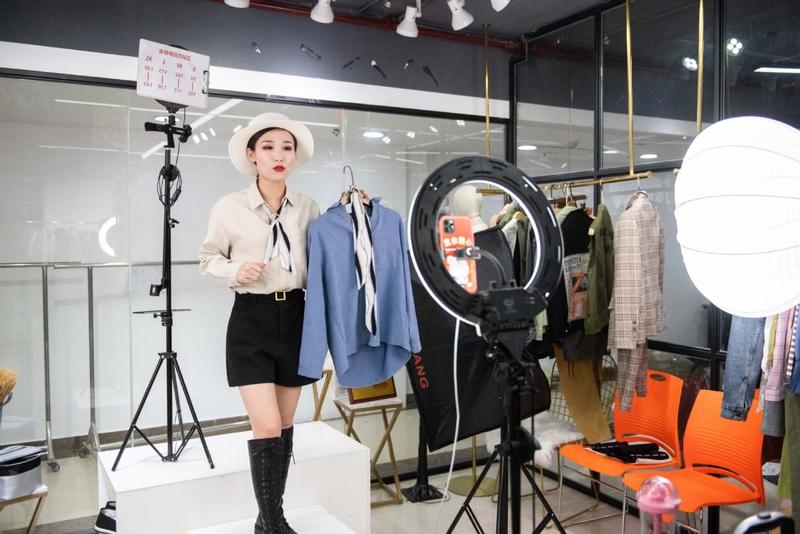 A model helps promote fashion sales via livestreaming at a shop in Zhuzhou, Hunan province. (PHOTO / XINHUA)
A model helps promote fashion sales via livestreaming at a shop in Zhuzhou, Hunan province. (PHOTO / XINHUA)
As the fashion sector reels from the novel coronavirus outbreak, there has been at least one silver lining to the crisis: the fast-forwarding of the industry's digital push.
Businesses are flocking to embrace the new format, with some choosing to unveil new products in the online realm
The latest instance of companies jumping on the digital bandwagon was the launch of the digital Shanghai Fashion Week on Tuesday, with technologies ranging from livestreaming to augmented reality saving the gala from a temporary blackout.
Organizers of the event, which has grown in reputation over the years, are hopeful that the tie-in with the country's top internet powerhouses will not only rescue but even help rewrite the global catwalk playbook.
All showcases of the autumn-winter 2020 edition will be broadcast till Monday via Tmall, the e-commerce platform run by Alibaba Group Holding Ltd, featuring 150 big-name international brands like Diane von Furstenberg as well as emerging local ones.
ALSO READ: Livestreaming gets a boost amid epidemic
"On the one hand, the online launch helps businesses resume operations and lend designers a hand in sales. On the other hand, it rhymes with the technological trend and helps companies explore and adapt to consumers' new shopping habits," said Lyu Xiaolei, vice secretary-general of the Shanghai Fashion Week's Organizing Committee, during a news conference.
Apart from the streamed sessions available to spectators around the world, the event will introduce a "See Now Buy Now" functionality, meaning viewers get to pre-order new looks from the collection in real time via their smartphones and wait for the parcel to be delivered.
The partnership is set to bring alive a full-chain solution for fashion designers and garment retailers, including a suite of solutions to personalize virtual storefronts, engage with customers through multimedia content, and conduct livestreaming on a more daily basis.
"The so-called 'cloud-launch' is definitely going to shake up the traditional launch event," said Hu Weixiong, head of fashion, luxury and fast-moving consumer goods at Tmall. "It tears down the physical limitations of time and geography for brands to engage with consumers."
Businesses are flocking to embrace the new format, with some choosing to unveil new products in the online realm. Commercial property operator Xintiandi is gearing up to premier its official virtual store "Xintiandi Pop Up" on Tmall, giving nearly 100 designer brands a digital makeover.
"The epidemic has expedited our digital deployment, pushing us to embrace the consumption revolution brought by e-commerce," said Zhang Bin, executive director at China Xintiandi as well as its owner Shui On Land, in a written statement to China Daily.
With the introduction of a cloud-based broadcast service powered by 5G technologies, Xintiandi hopes the cooperation "will provide creativity support and services to our tenants and China's original design forces", Zhang said.
Livestreaming has become the latest darling of traditional brick-and-mortar stores to keep visitors on the hook as the outbreak has largely minimized offline social interactions. Shanghai's Century Link, among the city's top three shopping malls by traffic volume, has adopted both livestreaming and short videos to retain customer attention.
READ MORE: New growth drivers — can they survive after the pandemic?
From the end of February to mid-March, the company has introduced at least three major livestreaming sessions, inviting online influencers to endorse products and services available at the mall, said Huang Wenhui, Century Link's marketing director.
"It's definitely going to be a long-term strategy as livestreaming enables a successful online-to-offline loop. It doubles as a sales channel and, perhaps even more importantly, a showcase opportunity," said Huang, adding livestreaming clips will be re-edited and uploaded onto Douyin, a popular short video app.


